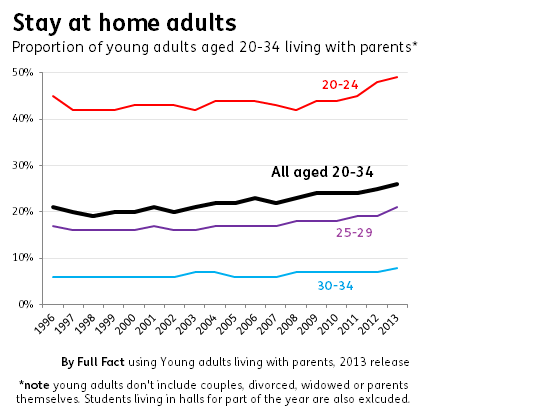More young people live with their parents, but housing costs are only one reason
"One in four [young people] are living with their parents because they cannot afford to buy a house or even rent one."
Ed Miliband, Prime Minister's Questions, 16 July 2014
Since the turn of the century, more and more young adults are finding themselves living with parents for longer. If you're 22 years old, you're equally likely to be living with your parents as you are to be living elsewhere. In 2000, 42% of 22 year-olds were still with their parents.
Those findings are from the Labour Force Survey which, as well as giving us regular employment figures, can also tell a story about household composition over time.
But there are limits to what the data can actually tell us. It doesn't count couples, single parents or students living in halls for some of the year as living with their parents even if they do in reality. And their reasons for staying at home can't be fully explained by unaffordable housing, as the Labour leader suggests.
Join 72,953 people who trust us to check the facts
Sign up to get weekly updates on politics, immigration, health and more.
Subscribe to weekly email newsletters from Full Fact for updates on politics, immigration, health and more. Our fact checks are free to read but not to produce, so you will also get occasional emails about fundraising and other ways you can help. You can unsubscribe at any time. For more information about how we use your data see our Privacy Policy.
Some people live with their parents but aren't counted
A number of people aren't included in the figures. If you're a parent yourself or you live with a partner, you're not counted as living with your parents even if they're in the same house. This is the case for 264,000 people aged between 20 and 34, or 2% of all young people of those ages.
Similarly, students who live in halls of residence during term time but return home to their parents aren't included either. There aren't any precise figures on how many people this applies to.
Data on UK-based full-time and sandwich students supplied to Full Fact by the Higher Education Statistics Agency suggests there are around 86,000 aged 20-34 living either in private halls or properties run by their institution during term-time. It's not possible to tell how many live at home outside of term.
It's difficult to quantify exactly how much this affects the figures, but the people Ed Miliband was referring to don't necessarily match intuitions.
Unaffordable housing one reason among many
The Office for National Statistics (ONS), which publishes the figures, admits that housing has become less affordable for young people and this contributes towards stay-at-home living.
At the turn of the century, for instance, the average first-time buyer's income was just under a third of the average house price. In 2013, it was less than a quarter.
But not everyone lives at home because they can't afford to live elsewhere. People who live with parents are more likely to be unemployed, and research has suggested this is linked to the recent economic downturn, although there will obviously be a connection between unemployment and how affordable housing is for people.
In addition, some people who live their their parents are economically inactive (neither in work nor actively seeking it), and for people living at home this is more likely to be because they are sick or disabled. Some of these people could be living at home because they need more care.
There's also evidence given by people themselves via surveys. Shelter found in 2010 that 45% of 18-34 year-olds claiming to live with their parents did so because they couldn't afford to rent of buy their own home. This is a significant proportion, but also confirms that more than half of people don't state this as a reason.
Update (28 July 2014)
Since writing the article we've been supplied with figures from the Higher Education Statistics Agency on the number of young students who live in halls of residence. We've incorporated these figures into the piece.
